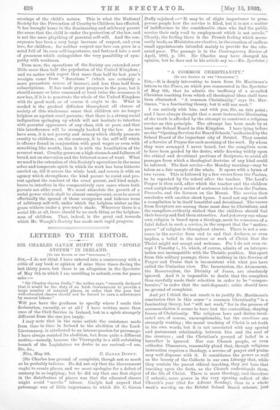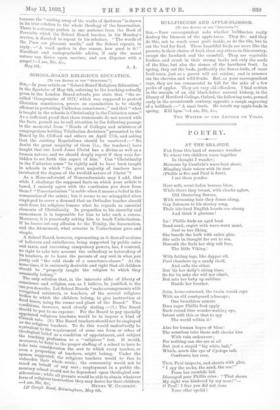" A COMMON CHRISTIANITY."
[To THE EDITOR. or THE " SPEOTAT010]
SrR,—It is deeply interesting to learn from Dr. Martineau's letters to the Times, on which you commented in the Spectator of May 6th, that he admits the inefficacy of a so-called Christian teaching from which all theological ideas shall have been eliminated. "A common Christianity," says Dr. Mar- tineau, "is a fascinating theory, but it will not work."
I am entirely with him, and with you, Sir, on this point ; and I have always thought that a most instructive illustration of the truth is afforded by the attempt to construct a religious, -service on this principle. The attempt has been made by at least one School Board in this Kingdom. I have lying before me the "Opening Services for Board Schools," authorised by the- School Board of the important city of Bristol. They consist
of a Service of Prayer for each morning of the week. By whom they were arranged I never heard, but the compilers seem to have been guided by the desire, while drawing widely upon the ethical and devotional portions of Scripture, to avoid all: passages from which a theological doctrine of any kind could
be inferred. The first service—for Monday morning—may be taken as a fair sample of the whole. It opens with a hymn of two verses. This is followed by a few verses from the Psalms, to be repeated by the school after the teacher. The Lord's- Prayer is then said, after which the teacher and the children read antiphonally a series of sentences taken from the Psalms, Proverbs, and the Sermon on the Mount. The service then concludes with another short hymn. I need not say that suds a compilation is in itself beautiful and devotional. The verses from Scripture are among those most dear to Christians, and the compilers evidently wished that the children should feel their beauty and find them attractive. And yet every one whose own religion is based upon a theology, must be conscious of a. fatal defect in such a service, in the respect that the " motive- power " of religion is throughout absent. There is not a sen- tence in the service from end to end that declares, or even implies, a belief in the nature or work of Christ that the- Theist might not accept and welcome. For I do not even ex- cept 1 Timothy i., 15, which, of course, admits of an interpre- tation not incompatible with the Theistic position. But apart from this solitary passage, there is nothing in this Service of Prayer and Praise that is inconsistent with what you have called the Unitarian view. The Incarnation, the Atonement,. the Resurrection, the Divinity of Jesus, are absolutely ignored. And it is impossible to doubt that the compilers, thus carefully made their selection in order to be " compre- hensive," in order that the anti-dognsati critic should have no ground of complaint.
And yet I think the net result is to justify Dr. Martineau's, conclusion that in this sense " a common Christianity" is a fascinating theory, but "will not work," for in the process of accommodation it seems to have lost the controlling, shaping forces of Christianity. The religions laws and duties incul- cated are, of course, unexceptionable, but the sanctions are strangely wanting ; the moral teaching of Christ is set forth in his own words, but it is not associated with any special and paramount relationship between him and the soul of the creature ; and the Christian's ground of belief in a hereafter is ignored. Nor can Church people, or even orthodox Dissenters, reasonably plead that, though religious instruction requires a theology, a service of prayer and praise may well dispense with it. It constitutes the power as well as the beauty of the Collects in our own Liturgy that, while they contain the purest ethical teaching, they yet base that teaching upon the facts, as the Church understands them, of the life of Christ. There is more theology, and therefore (I submit), more power in the very opening collect of the Church's year (that for Advent Sunday), than in a whole week's worship on the Bristol School Board scheme, just because the "casting away of the works of darkness" is shown in its true relation to the whole theology of the Incarnation. There is a strange pathos in one sentence from the Book of Proverbs which the School Board teacher, in his Monday's service, is directed to repeat to his scholars. "The words of the Pure are pleasant words," and the School repeats, in reply : —" A word spoken in due season, how good is it ! " Excellent and unimpeachable advice, if only the moral nature can thrive upon maxims, and can dispense with a gospel !—I am, Sir,



































 Previous page
Previous page